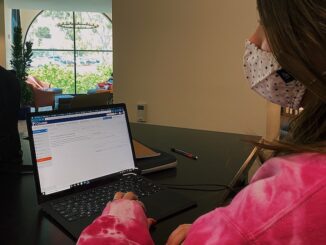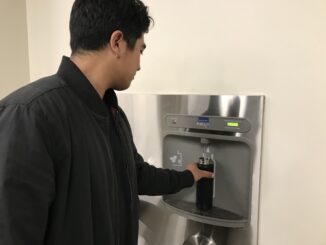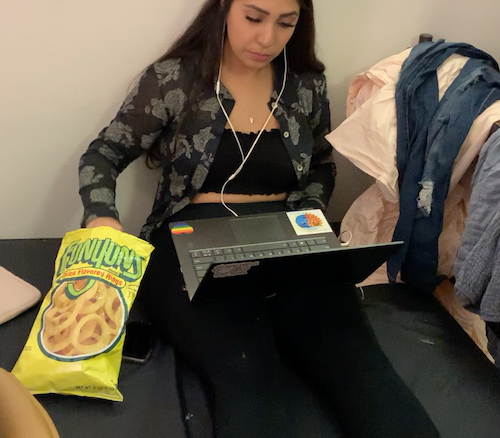
Tune into the Netflix revolution, where students prefer bonding shoulder to shoulder over face to face.
The impact of TV on Pepperdine students is widespread. It affects the amount of time they spend with one another, what they talk about, and the culture they share.
“It’s just ingrained in us as Americans. said Mark S. Jacobs, director and Pepperdine adjunct professor teaching video journalism. “We watch TV.”
Students watch a variety of things on a variety of platforms. The effects of this viewership on students’ social and personal lives are equally varied.
What students are watching
A Pepp Post poll of 71 students found the three most favorited genres on campus are comedies, dramas and dramedies. Of the 12 students interviewed, the most frequently mentioned shows are “The Office,” “Game of Thrones” and “Black Mirror,” each of which are easily accessible through either Netflix or HBO GO. Pepperdine students report watching several shows from several genres to satisfy each taste.
“Television is still the most consumed media,” said Becky Hartung, Pepperdine communication professor and humor communication expert. “It’s this really powerful component. It matters to us as a culture.”
Although dramas and comedies are the most popular, students reported watching everything from anime to historical fiction.
How students are watching
Stream, Stream, stream – 82 percent of students watch television online through a streaming service like Netflix, Hulu or individual network apps using their parents’ cable subscriptions. In fact, more students are watching TV using illegal streaming sites like Putlocker than using live cable, according to the poll.
That being said, computers and cell phones are the primary mediums to access these streaming sites. Only about 14 percent of students are watching on a traditional television.
In terms of time spent watching TV, about half of students polled said they watch between two and seven hours a week. Few watch more but even fewer watch none.
Positive social implications
About 75 percent of students report watching TV alone either all or most of the time, yet students still said it has a positive impact on their social lives.
“I think the general stigma is that when you’re engrossed in TV you are ignoring everyone else when in reality I think you can use it as a very social thing,” David Kellogg, sophomore business administration major, said.

Pepperdine students generally interpret TV viewing as a social thing even if the actual act of watching TV is done in private. This is because students can relate to each other based on their shared TV interests, Danielle Howard, sophomore media production major, said. TV bonds people because it gives them something to talk about.
“Everyone in the whole world can watch the same thing and connect to one another,” Howard said.
Sophomore physics major Will Soiland said that when he reenacts a scene or portrays a character that his friends understand and can laugh about, it bonds them as a group.
“You know, when you guys watch the same show it’s something you can talk about and it’s like ‘boom’ instant connection,” Jeff Haas, senior business administration major, said.
That being said, some students said TV can take some of the pressure off of introverts who need an escape from constant social interaction. Not being around others for a while is not inherently bad.
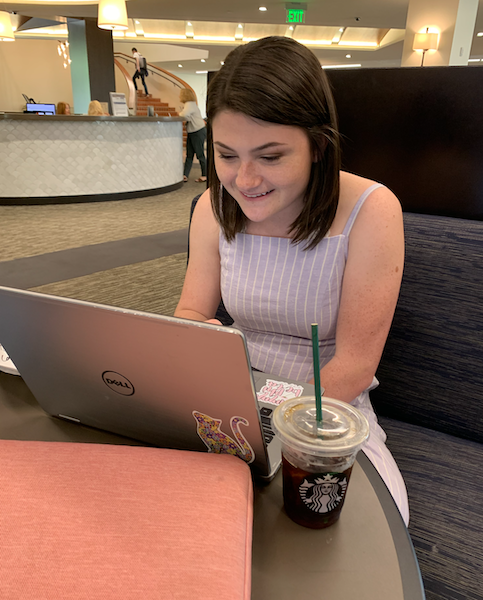
Sophomore biology majors Karly Kern and Katie Thompson are close friends. Kern identifies as an introvert while Thompson is an extrovert. They use TV in polar opposite ways.
“I think television makes me a more social person because it allows me to do stuff by myself so then I’m more willing to have people around me,” Kern said.
Meanwhile Thompson uses TV to spend time with others.
“TV makes me more social because I watch it with friends,” she said.
To an introvert, that time to reflect and get lost in a plot is priceless, Marissa Guilmain, sophomore media production major, said.
“Sometimes I just need my introvert time,” Guilmain said. “I need to watch TV and relax and unwind … It keeps me from having to go out and hang out with people socially in public.”
For some, TV functions as both a group bonding activity and an individual escape.
“Sometimes watching big shows that a lot of people discuss like ‘Game of Thrones’ coming up in the spring, I can talk about that with a lot of people because there is a rather large community on campus who loves that,” Kellogg said. “But also there are times when I want to have no social interaction whatsoever and curl up in my room and watch TV just to waste some time. So in some ways it does help in social atmospheres and in others it kind of draws me away.”
Negative implications
Although students appreciate the benefits of television, most agreed that there is a limit to how much TV viewing is healthy. Most said they have engaged in binge-watching, which Merriam-Webster defines as watching “ many or all episodes of (a TV series) in rapid succession.”
“I do engage in binge watching occasionally when I am very stressed,” junior physics major Kayley Butler said. “For example, several weeks ago I started watching ‘Queer Eye’ and I did no homework for three days. I just watched ‘Queer eye.’ ”
Binge-watching releases large amounts of dopamine, the same chemical triggered by sex and heroine, Danielle Page wrote in a 2017 NBC article. When a viewer finishes a series after binge-watching, they experience dopamine withdrawal similar to that of a drug addict.
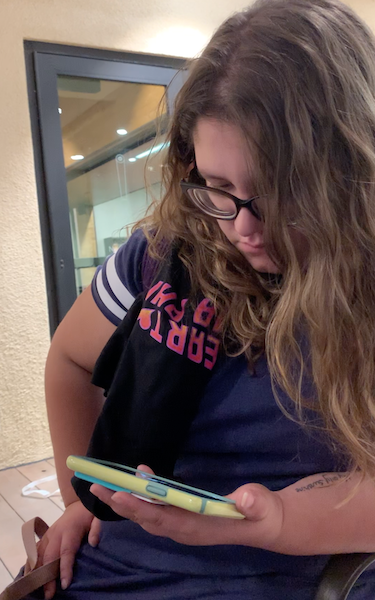
“One time I watched that show ‘Atypical.’ It has two seasons,” Guilmain said. “I watched both seasons in a day and didn’t do any of my homework so that was rough. It’s not my best moment.”
Guilmain said TV has a mixed effect on her social life because it creates social opportunities that wouldn’t otherwise be there, such as movie nights with friends but it also provides an outlet when she doesn’t care to see anyone.
Socially, too much TV can be similarly bad, Spencer Lindquist, freshman political science major, said. It really depends how it is used more than anything.
“I think for a lot of people it might have a negative impact if somebody is just watching Netflix in their room alone for six hours,” he said.
Binge watching is also associated with loneliness or increased need to feel one belongs, Jessica Firgir wrote in a January 2015 CBS News article. Television programs can serve as social surrogates in providing a sense of belonging. The attachment people feel to certain programs can discourage real-life attachments.
The type of TV consumed is also critically important, Hartung said. For instance, the popular Netflix series “13 Reasons Why” about a teenager who commits suicide, sparked copycat teen suicides all over the world, according to ABC and Refinery29 reporting.
Therapeutic Implications
TV can be harmful, Hartung said. But it also has the power to be therapeutic in unique ways.
“There was a study done in the early 2000s that watching an episode of ‘Friends’ relieves more stress than deep breathing or meditation,” Hartung said. “Researchers found that it was specifically because of the humor.”
Hartung said she has used TV as a coping mechanism.
“I have always struggled with like anxiety and depression,” Hartung said. “So [TV] has always been a thing that I can use to like get out of my own head and like focus on something else.”
She said she also encourages her students to use TV for their mental health, particularly comedy.
As a student she would use TV as a reward system to improve her work ethic.
“I would set a benchmark for myself,” Hartung said. “ ‘I’m going to finish this page and then I’m going to finish this episode of “New Girl” and come back and finish another page.’ ”
Judith Brister-Knabe completed the reporting for this story in Jour 241 in Fall 2021 under the supervision of Dr. Christina Littlefield and Dr. Theresa de los Santos. Dr. Littlefield supervised the web version of the story.


